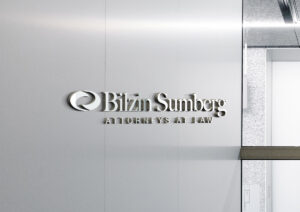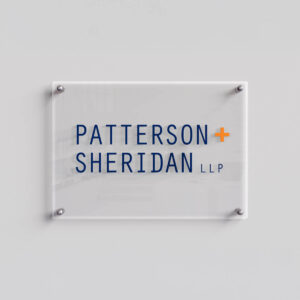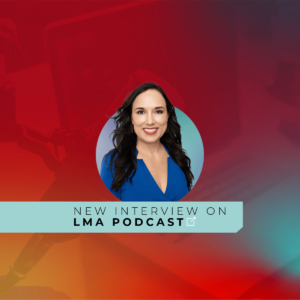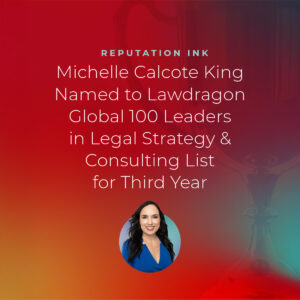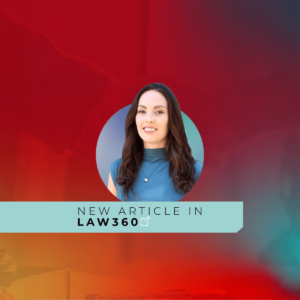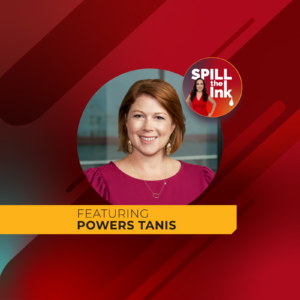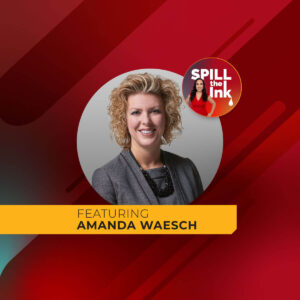
Spill the Ink: The Reputation Ink Podcast
Why your attorneys should feel like part of the marketing team
On paper, Julia Thomas is a one-woman band as Dean Mead’s marketing director. But in reality, she works in tandem with more than 100 unofficial marketers. Yep — attorneys and staff have a crucial supporting role to play as advocates for their firm and its brand, and Julia has made it her mission to empower them.
In this episode of Spill the Ink, Julia discusses how her approach to legal marketing creates a culture of shared responsibility and reveals what she’s learned about helping busy attorneys stay engaged with community-focused initiatives. And with 20 years of experience in global, national, regional and local marketing roles across the legal, accounting and construction sectors, she’s learned a thing or two.
Here’s a glimpse of what you’ll learn
- Why Dean Mead’s marketing director Julia Thomas views all attorneys and staff as unofficial marketers
- About Florida-based Dean Mead, a commercial law firm founded in 1980
- What a 20-year career in global, national, regional and local marketing roles in various industries has taught Julia about using internal communications to support external communications — and surviving debates with attorneys
- How law firms can approach strategic partnerships in the local community and engage attorneys to participate
- Julia’s advice to busy legal professionals pursuing pro bono and community work
- Why thought leadership doesn’t necessarily mean writing a long, in-depth article (and, in fact, that’s often less effective)
- The impact of reputable law firm awards and rankings in building credibility with prospects
About our featured guest
Julia Thomas is Dean Mead’s director of marketing and business development, based in Orlando, Florida. With 20 years of experience designing, implementing and directing initiatives that support consistent internal and external communications, Julia brings a thorough understanding of marketing and business development to the firm. Leveraging her experience serving Fortune 100, national and regional companies, she is the chief marketing strategist for Dean Mead and each of its offices, departments and industry teams. Julia works closely with the president, board, department chairs and industry team leaders to develop and implement marketing and business development activities.
Resources mentioned in this episode
- Check out Dean Mead’s website
- Follow Dean Mead on LinkedIn, Facebook and X
- Connect with Julia Thomas on LinkedIn
- Say hello to Michelle Calcote King on X and LinkedIn
Sponsor for this episode
This episode is brought to you by Reputation Ink.
Founded by Michelle Calcote King, Reputation Ink is a public relations and content marketing agency that serves professional services firms of all shapes and sizes across the United States, including corporate law firms and architecture, engineering and construction (AEC) firms.
Reputation Ink understands how sophisticated corporate buyers find and select professional services firms. For more than a decade, they have helped firms grow through thought leadership-fueled strategies, including public relations, content marketing, video marketing, social media, podcasting, marketing strategy services and more.
To learn more, visit www.rep-ink.com or email them at [email protected] today.
Transcript
[00:00:00] Julia Thomas: Get out there and have a conversation with your attorneys. I promise you they want to talk to you. They really, really do.
[music]
[00:00:08] Announcer: Welcome to “Spill the Ink,” a podcast by Reputation Ink, where we feature experts in growth and brand visibility for law firms and architecture, engineering and construction firms. Now, let’s get started with the show.
[music]
[00:00:25] Michelle Calcote King: Hi, everyone. I’m Michelle Calcote King. I’m your host and I’m also the principal and president of Reputation Ink. We’re a public relations and content marketing agency for B2B professional services firms, including law firms. To learn more, go to www.rep-ink.com.
Marketing a law firm is complex, which is why we love to invite industry veterans to talk about what’s working and what’s not working at their firms. Today, I have Julia Thomas with me.
She’s the director of marketing and business development at Dean Mead. It’s a corporate law firm that’s been around since 1980. She’s got an accomplished career. She’s worked with Fortune 100, national and regional companies throughout her career. She’s especially focused in professional services, including construction, accounting and the law, which is one of the reasons I’m excited to talk to you. I want to pick your brains about the differences because we work across professional services. If you follow her on LinkedIn, you know she’s really involved in her local community.
Welcome to the show, Julia.
[00:01:24] Julia: Thank you, Michelle. I’m very, very glad to be here and impart whatever wisdom I have. Happy to share.
[00:01:29] Michelle: Awesome. Yay. Well, let’s give our audience a little context. Tell me how you got into legal marketing and tell me a little bit about the firm.
[00:01:42] Julia: I feel like everything happens for a reason. I think once you do this long enough, you sort of might agree with that statement, but to your comment, I’ve been in professional services marketing for over 20 years. To be referred to as a veteran is such a unique position to be in because it means I’ve also survived for 20 years in this profession. I say falling into legal marketing, it actually picked me.
I had been traveling the world in a global role for several years. Then COVID happened, which changed everybody’s world and allowed us to step back and really evaluate what we were doing from a career and a personal perspective. I did what everybody else did and did precisely that. I ended up relocating back to Florida from Charlotte and then after a short time with a construction firm, about two years, dove back into legal marketing.
I joined the firm because of the leadership of the firm and the vision of the firm. They are very much focused on intentional growth and not an organic component, so very intentional, driven professionals, which makes sense with attorneys, but they’re also very open to conversation and change and different ideas. That in my career is somewhat of a unique moniker to share in a professional services environment. Sometimes they’re sticklers.
Being able to have an opportunity to join Dean Mead and work with Marc Chapman and our other leaders in the organization was a great opportunity, and I hopped on it. Two years later, I’m still here and loving it. I love the firm. I love Dean Mead and actually can—
[00:03:28] Michelle: That’s great.
[00:03:28] Julia: -—ay I love every single one of my attorneys.
[00:03:30] Michelle: Oh, that’s great. I love to hear that. Well, tell us a little bit about your team. How is your team structured?
[00:03:36] Julia: Yes. My first introduction to the firm was actually at an attorney retreat two years ago in August. I specifically remember first talking to them about the fact that I’m a University of Florida Gator. Go, Gators!
[00:03:50] Michelle: Go, Gators!
[00:03:51] Julia: Go, Gators! Then also sharing with them that while I may be the single marketing professional in this firm, I have a team of 58, meaning every single attorney in that room is a marketer. Whether they have it in their title or not, they are a marketer. A few were a little surprised at that comment, and others stood up and applauded because of—
[00:04:14] Michelle: Wow.
[00:04:14] Julia: —their passion for marketing. To your comment, I am the single sole source marketing professional with Dean Mead, but I have a team of 58 and really a larger team of 120-something. I’ll have to double-check the numbers with HR because everyone in the firm is really an advocate of Dean Mead and a supporter of marketing.
[00:04:34] Michelle: That’s really huge for that to happen in a law firm because that’s often the biggest challenge that marketers face. I can see why you’re so positive about your firm. How did the firm get that culture? Do you know where it came from?
[00:04:51] Julia: I’ve asked the question because, to your comment, it is very unique. I’ve had the fortunate opportunity to work with an organization that has evolved from a very, I guess, stronger culture that’s fearful of change to ones that are then open to change. I’ve seen that in my career, lived it, and led it, which is great.
Joining Dean Mead, depending on who you talk to, it depends on really their response. They’ve been through a lot of change themselves within the marketing team. They had one professional that was on board for a number of years. Then after she left the firm, they had worked through some very talented professionals that had specialties in different disciplines within marketing, whether it’s PR, or design, or social media. Those were their specialties.
When I came on board having the years of experience I’ve had within all of those specialties, it was somewhat of a breath of fresh air for the organization because they were able to leverage that across the board. No matter if they’re focus was social media or building their thought leadership, or just getting out there and networking, I’m able to help work alongside our attorneys and help them achieve their goals from a business development standpoint. I believe that’s why it’s open. I’m a chameleon from one section to the next, one attorney to the next.
[00:06:10] Michelle: Interesting. Yes, that’s an interesting point because we are living in this age of the specialist, right? Being a specialist has a lot of value. But when you’re in-house, often — especially at a firm of your size — having more of a generalist understanding it from a strategic aspect and really understanding all of the aspects of marketing is incredibly valuable, and knowing when to bring in the specialist and who you might need. Understanding when you need the generalist and then to pull in those specialists, I’ve seen that dichotomy play out at different times. It’s really critical that the in-house person has more of that generalist strategic mindset than the specialist. Yes, right. Very crucial.
[00:07:06] Julia: I have shared that there’s no way I would have been successful in this position if I hadn’t had held positions at a global level, national, regional and local. So that I have those perspectives. They’re very diverse perspectives, yet they complement one another, particularly to your comment. When you join a firm that needs each of those perspectives, it may not know it at the time, but they need each of those perspectives in order to help their practice areas and industry groups grow because each of those is different in their own right. Some of them are more local, shop around the corner, and others are more broad-based and statewide. It just depends.
[00:07:45] Michelle: Yes. Tell me about having been in different—
So you’ve done accounting, you’ve done construction, and now law. Can you tell me a little bit about the differences in terms of—
We’re a professional services marketing agency, and we work in construction, architecture, engineering, law. There’s a lot of overlap, but there are differences. What do you see as the differences? I’d love your take.
[00:08:17] Julia: The primary difference I see is construction’s tangible, and so is engineering. When you’re working with a construction manager, whom I worked for, a very talented group out of Gainesville, not Orlando, but when you work for them, they’re producing a building. They’re producing something you can literally walk into in six months. It’s great.
While, accounting, and I used to joke with the professionals I worked alongside in that field, when you spend hours upon hours upon hours upon hours doing audited financial statements and then come through with a three-page document, it’s a bit different to try to really align in with, “Well, our time was the commodity here, not a specific, tangible three-page document.”
That is similar to the legal profession because a lot of what our attorneys do is provide their legal expertise and their advice and counsel to support our clients in the next steps of their business. When they do that, that is not necessarily a tangible piece that they’re going to walk out of. If I’m lucky, they’ll walk out with a Dean Mead pen, but that’s as close to the tangibility that they’re going to walk out the door with.
Other than that, it really is the expertise of the professional that’s providing that counsel and providing that service. Other than that, and we’ve all heard this phrase in our careers, same circus, different monkeys. Other than that, people are the same. They very much are the same. We’re all the same, whether it’s a construction manager, a CPA, or an attorney with 40-plus years of expertise. Each profession and each professional is really focused on helping serve the client, period.
They all have positive intent around that. In that similarity, there they are. They’re the same. In that line of thought, they’re the same, but it’s just the intangible product.
[00:10:10] Michelle: Yes, “Selling the Invisible.” Yes, absolutely.
[00:10:13] Julia: Yes, “Selling the Invisible.” You should coin that, Michelle. “Selling the Invisible.” I like that.
[00:10:18] Michelle: It’s the title of a book, so I didn’t coin it.
[00:10:20] Julia: Great. That’s great.
[00:10:22] Michelle: It’s a book on my bookshelf.
I noticed that Dean Mead is very involved in the community. I wanted to get your take on, one, how do you support that? How do you help the firm decide which strategic partnerships to pursue? It sounds like you’ve already got attorneys who already understand the importance, but how do you encourage them? How do you support those efforts?
[00:10:50] Julia: It’s a multifaceted approach because you are working with individuals, very busy individuals, billable individuals. It can be very challenging. First and foremost, Dean Mead was founded with a foundational focus on education. We have a history in education, whether it’s Take Stock In Children or serving as an initial influencer and investor in the UCF Medical School.
[00:11:15] Michelle: Oh, wow.
[00:11:15] Julia: We’ve definitely done that from cradle to graduate. It’s across the board. Locally, community focus is really local as well, so within our communities, so we’ve got five offices statewide. As you shared, I’m in Orlando, but we also have an office down in Naples, which is completely four hours away, opposite side of the world; Vero Beach; Fort Pierce; and then Melbourne-Viera area.
Each community is very unique in and of themselves. Community support is a big focus as well. For example, Vero Beach is really focused on United Way because they really are focused on local community and giving back to local community where it’s needed. We also have that approach. Then aside from that, you also have the individual focus. As I shared, attorneys are super busy people, as we all are.
When you want to actually support a community effort, you need to make certain that you’re going to be there to truly support that effort. What I mean by that is whether it’s a volunteer activity, or you’re serving as a board member, my counsel to my attorneys is that you need to show up each and every time.
It’s like I share with them, “Look, I’ve gotten facials, the best thing I’ve ever done. The facials and manicures once a month for the past four years. I’ve never canceled one of those appointments ever. Ever. I have canceled a dentist appointment. I’ve done that in my lifetime. You could see the priority.” I said, “You want your community effort to be more on the facials and pedicures side, not the dentist appointment because, really, you’re giving of yourself, you’re giving of your community, and you’re supporting your local community. Make it something that you’re passionate about.”
Our attorneys, in addition to the educational focus and community focus they are passionate. They are passionate professionals that are focused on children. Pets, of course, are always very popular. Everybody has a dog. Then also higher education and investing their time there. We support our professionals to really support their community.
[00:13:22] Michelle: I love that analogy. Yes, we’d all rather go get a nice facial rather than get our teeth cleaned. Yes, make it something that is enjoyable and that they’re passionate about, and they’ll be more likely to go actually do it and stay involved. Yes, I love that.
You guys are also very active in thought leadership and writing articles, securing media placements. Tell me, one, are there pain points that you have in terms of that?
I find that often, getting attorneys to participate in thought leadership to write the content is often a challenge sometimes for marketers. How do you make that happen in your firm? It seems like you’re making it happen. Obviously, you’re one person. Tell me about that process in your firm.
[00:14:21] Julia: This is actually a focus of our firm for this year. I set up annual marketing goals for the firm, presented to the board and then shared it with our attorneys and our team. Thought leadership is something that we need to invest in as a profession, not just as a firm. I will stand on the soapbox and say that loud and clear to everyone to help support my fellow marketers.
The big success I’ve had is, first and foremost, we do not need our attorneys to write a legal paper for every single piece of thought leadership that goes out there. Most of them, in my experience, feel compelled to do so. We’ve had some very talented professionals published in the “Florida Bar Journal.” They’re amazingly talented professionals. You go to the end of the article, and it cites no short of 20 sources. That’s a fabulous, amazing thought leadership but does not always need to be what the focus needs to be.
[00:15:16] Michelle: Right, not at all.
[00:15:16] Julia: Most oftentimes, it’s translating something that’s super complex from a legal perspective to something that someone outside of the legal profession can understand, i.e., me.
I partner with my attorneys and sit down with them and just have a coffee conversation and say, “All right, I’ve heard about this law that’s going into place, or I’m reading locally, there’s an impact on local real estate, what do you think about that?”
I catch them in the kitchen and have a conversation and then walk out, capture my notes super quickly, and make a short little blog post, send it over to them, they read it and go, “That was a fun conversation. We need to do that more often.” Here we have thought leadership. We get it posted. It goes out there. Hopefully, it gets hooked by media and then we go from there. It’s changing the thought process to share that it doesn’t need to be a hugely complex article; it really is just a conversation on paper. That’s a big, big deal.
[00:16:14] Michelle: That’s so true. Yes, they get caught up in the “It’s got to be this complex, deep article.” I’ll share. We got a client placed with Axios, a huge media outlet. The article came out, and the entire thing was bullet points. The entire article. I was like, “Wow, that’s so fascinating, that even the media is even going a little bit toward—”
And it was really easy to read. As I just scanned through it, I got the point. I thought that’s a really great example of it. Not everything has to be this deep narrative style. It can be bullet points, the whole thing. It can be a 60-second video. So getting them out of that is really important. I love that.
Tell me about your strategy with rankings and awards. Are there a few that you focus on every year that are must-do’s? How do you how do you approach that?
[00:17:24] Julia: The first the first and foremost, the best award, and I shared this with my team, is a compliment from a client. That is the ultimate award. I can pitch you for opportunities across the state, across the nation, across the industry, but that’s really the award that you want. That’s what I encourage our team to do.
There are others within the industry groups and within the practice areas that tend to be important more so because it helps with that thought leadership component. It ties into their opportunity to get published at a different level. There are others we support, too, just because within certain practice areas and industry groups, they don’t they don’t really have an award.
From a client perspective, a potential client perspective, when they’re reviewing a website bio, they don’t know that AV fill-in-the-blank award, what that means, and we’re not expecting them to. We shouldn’t expect them to then go Google what in the world Martindale means, you know what I mean? It’s just a different thought process.
When they see something like Orlando’s Best Attorney or a Best Lawyer, you and I both know what “best” means. It gives some additional credential potentially, and we’ve heard this from our clients to say, “Hey, they’re ranked the best. I don’t know if that was peer-reviewed or submitted and such like that, but they’re the best.” Those are ones that I tend to support.
What I do not support are pay-to-play opportunities because those are not based on any single credential. There’s very limited client interaction there, very limited peer review. I hear them, and I definitely hear out the attorneys that are interested in them. Most oftentimes, by the end of the discussion, they agree that this is not where you need to spend your time.
[00:19:15] Michelle: Yes. We spend a lot of time educating clients on that fact. In fact, we have a little cheat sheet that says, “Is this legit?” to help clients that just “Does it do this? Does it do that?” because there are some markers that you can quickly figure out. “Have you ever heard of them before? Are they overly glowing and just think you’re the best thing ever?” It’s a quick way to know they’re about to ask you for money.
[00:19:54] Julia: That’s it.
[00:19:56] Michelle: Well, you just talked about how you had set your plan for the year and your goals. Tell me what’s next this year. What’s your big focus?
[00:20:05] Julia: Last year, we really focused on getting our foundational processes in place, so developing the processes that help support foundational communication that are supported by a solid budget. This was the first step coming on board, sitting down, presenting that to the board, and then really helping to educate our team, both one-on-one conversations and group conversations around why it was important. So really gaining that momentum to then go to the next step of that, and that’s actually doing it.
To our earlier conversation, to building out thought leadership, to developing a LinkedIn profile, to committing or developing out our internal CRM system, which I’m not naming the CRM because that is a bad three-letter phrase to include with attorneys that have been through a bad CRM. So re-branding that a little bit internally. Building out our CRM system so then we can, next year, really throw up a more robust thought leadership program that’ll be directed to clients.
We’re still working on really those foundational pieces that are going to help build out successful external campaigns, as well as, and I have to add this in here, build out internal communication, too. Because, as I shared earlier, I have 50-some attorneys that are my marketers, but I really have a team of 120-something, again, I need to go back to HR and confirm the current number, of professionals that are out there already marketing the firm.
The best thing we can do is share what we’re sharing externally internally with them first, highlight and spotlight that, and then go external. We already have these professionals that are working on that, too. There’s a big correlation between, this year, developing external communications that are supported by internal communications, which I also work on as well.
[00:21:53] Michelle: Yes, it’s so true. Yes, that internal communications is such an important—
And can take up a good portion of a marketer’s time, especially in professional services when that cross-marketing is so important. You don’t want your attorneys not knowing critical information about your firm, not understanding your value proposition, not understanding your community efforts, all of that.
I can’t not ask this. Sometimes I hate to, but let’s talk AI. Is this something you’re looking at? Have you dabbled in it? Are you using it at all?
[00:22:32] Julia: AI is here. To your point, I’m hesitant to ask about it, too, and talk about it, too—
[00:22:38] Michelle: I know.
[00:22:38] Julia: —because there’s a lot of unknown around it. The application of how it’s really going to benefit and the equal side of the coin is how it’s really going to hurt the industry. We’re trying to figure that out. I use the analogy with AI that we’re trying to change the tires while the car is running because we’re trusting it in places while we still need to move forward.
I’ve dropped into it more from a thought leadership perspective, just to see how it would react and produce. I’m not sold on it yet. I’m still open, absolutely, but I still believe that human connection, catching professionals that are having a cup of coffee and having a conversation there provides a better thought leadership piece than AI-generated content where you drop a law in.
I’m not sold on it yet, but to your comment, I’m keeping a pulse on it, both within marketing and in the overall legal profession as well, just because it’s here. It’s not going anywhere. We might as well figure out how we can work with it and work the best way we can with it.
[00:23:46] Michelle: Yes, that’s a really great answer. It’s here. I feel like people who are either just completely going, “No, not for me,” or “It’s everything,” get it wrong. It’s somewhere in between. It’s like when the internet came out. It is going to change things, but we’re still going to communicate. We are going to meet in person. It’s just it’s a little bit different.
[00:24:17] Julia: It is.
[00:24:17] Michelle: Absolutely.
Well, I’d love to let you give one final thought to our listeners. If you were to leave them with one final thought about marketing a law firm and best practices, what would it be?
[00:24:32] Julia: Do not stay in your office and give up on email. The best advice I can give to any marketer is to get out there and have the conversations with your attorneys. I promise you they want to talk to you. They really, really do. It may not be during a scheduled meeting; it may be an offset request in the elevator or grabbing a cup of coffee or sitting down in the lunchroom, but get to know your attorneys.
Get to know what they do. Talk to them about their industry groups. Talk to them about their practice areas. Talk to them about their kids. They are professionals just like you are, so the more you do that, the more you end up with—
And I’m just looking in the background. I have a cow cutout in my office because I’ve gotten to know our agribusiness group very well and know the importance of adding a bit of fun to our communication, so I’ve got a cutout cow for conferences. They love it, and it works, and it resonates, and it’s fun, but that is the first piece of advice.
The second piece of advice, and this is even stronger for those marketers that are really in their six to seven-year position within the profession, is to understand you have experience. The attorney has experience, too, but you are allowed to go into a conversation, perfectly permitted to go into a conversation and question the professional across the room that happens to be the attorney because you have that level of expertise to then question them and get into a professional dialogue and debate. Attorneys love to debate. Work with that. Have fun with that and learn from that, but also remember to stand up for yourself through that.
Those are the big two pieces of advice, and the third one is, make certain you do walk away every once in a while because it’s always good to walk away, refresh, recharge, take the vacation. I promise when you come back, there will be plenty of work for you to do. There always is, so come back from the vacation, but enjoy it while you’re there. So sign off.
[00:26:31] Michelle: That’s fantastic advice. There’s so many marketers that get intimidated by attorneys because attorneys are so confident. They’re trained to be confident. They’re trained to be debaters. They’re trained to be skeptical about everything. Marketers often assume or they just take a step back and don’t understand the value and the expertise that they do have, so I love that advice. Thank you very much.
[00:27:04] Julia: You’re welcome.
[00:27:04] Michelle: We have been talking to Julia Thomas of Dean Mead. If anyone wants to connect with you after the show, what would be the best way for them to do that?
[00:27:13] Julia: Easiest way is, find me on LinkedIn. To your earlier comment, I am very active on LinkedIn. I connect, I have conversations, I’ve got coffee chats, I share articles. If you have a new posting in your firm where you’re trying to hire someone because sometimes marketers overlap into that, too, I’m happy to help promote that. Just reach out and let me know how I can help you because I’m happy to do it.
[00:27:37] Michelle: Well, thank you so much.
[00:27:39] Julia: You’re welcome.
[music]
[00:27:41] Announcer: Thanks for listening to “Spill the Ink,” a podcast by Reputation Ink. We’ll see you again next time. Be sure to click “Subscribe” to get future episodes.
[music]
Related Law Firms
Elevating a National Litigation Firm’s Profile Through Strategic PR and Thought Leadership
Reputation Ink | Jun. 17, 2025
Crafting attorney bios that instill trust, build relationships and boost reputation
Reputation Ink | Apr. 22, 2025
How Patterson + Sheridan tells its technical story and wins new business with crisp, compelling content
Reputation Ink | Jan. 7, 2025
Join the INKsights Email List
Get Exclusive Updates on Awards, Lists, Rankings, Editorial Opps and More.
Subscribe to our newsletter, INKsights, to receive insights (pun intended) on thought leadership, public relations, and marketing for B2B professional services firms sent straight to your inbox.
Available only to our email subscribers:
Once a month, you’ll receive the latest awards, rankings, lists and editorial opportunities in the legal or AEC industry (you choose which you’d like to receive).
In the off weeks, we send you our latest thinking on the marketing and PR issues facing those industries. You can opt out anytime (although we’ll bet our favorite coffee mug you’ll never want to leave).


